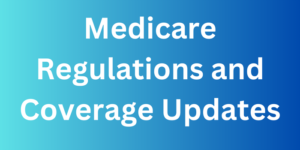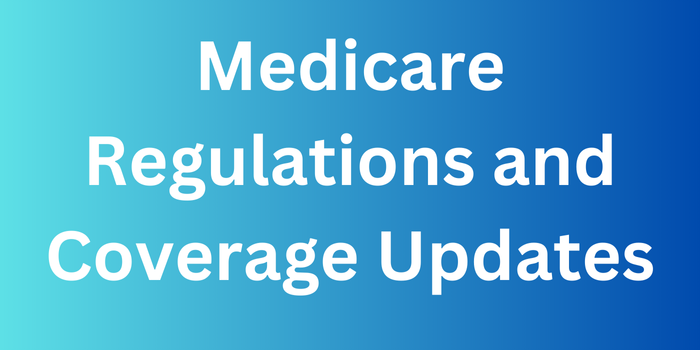Medicare Regulations and Coverage Updates: What Beneficiaries Need to Know
Medicare can be a complicated system to navigate, especially with all the rules and coverage options changing all the time. In order to guarantee that beneficiaries receive the finest care and benefits available, they must be informed about these developments. This blog will examine the most recent changes to Medicare regulations and coverage, offering beneficiaries vital information.
Understanding Medicare
- Medicare is a federal health insurance program that covers people with end-stage renal disease (ESRD) and certain impairments at a younger age, but it is primarily intended for people 65 and older. The program is divided into various sections, each providing a particular area of coverage:
- Part A: Hospital Insurance
- Part B: Medical Insurance
- Part C: Medicare Advantage Plans
- Part D: Prescription Drug Coverage
Recent Medicare Regulations and Updates
1. Annual Enrollment Period (AEP) Changes (Medicare Regulations)
Every year, from October 15 to December 7, Medicare’s Annual Enrollment Period (AEP) takes place. Beneficiaries may enroll in, change, or discontinue their Part D and Medicare Advantage plans during this period. The significance of evaluating plan alternatives annually has been underlined by recent changes, since costs and coverage can vary from year to year.
2. Telehealth Services Expansion (Medicare Regulations)
Medicare increased coverage for telehealth services in response to the COVID-19 epidemic, enabling participants to receive medical care from a distance. In many situations, this extension has been extended indefinitely, allowing beneficiaries to access a greater range of telehealth services, such as routine check-ups and mental health treatment. It is recommended that beneficiaries consult their physicians to ascertain the specific services that are accessible via telehealth.
3. Coverage for Preventive Services (Medicare Regulations)
Medicare continues to emphasize preventive care, offering various services at no cost to beneficiaries. Recent updates include expanded coverage for screenings, vaccinations, and wellness visits. Beneficiaries should take advantage of these services to maintain their health and catch potential issues early.
4. Changes to Part D Prescription Drug Coverage (Medicare Regulations)
Certain drug coverage may change when the Centers for Medicare & Medicaid Services (CMS) adjusts the formulary for Part D plans regularly. Each year, beneficiaries should check the formulary of their plan to make sure their prescription drugs are covered and to be aware of any price changes. Furthermore, the Inflation Reduction Act has implemented steps to reduce the cost of prescription drugs, including as capping beneficiaries’ out-of-pocket expenditures.
5. Medicare Advantage Plan Enhancements (Medicare Regulations)
Medicare Advantage plans (Part C) now offer more benefits like dental, eye, and hearing care, among other coverage alternatives. During the AEP, beneficiaries should investigate these plans to see if they provide more affordable or better coverage than Original Medicare.
What Beneficiaries Need to Know (Medicare Regulations)
1. Stay Informed
For updates on rules and changes to coverage, beneficiaries should frequently visit the official Medicare website as well as other trustworthy sources. Recipients can make informed choices about their healthcare options by remaining informed.
2. Review Your Coverage Annually
Beneficiaries should review their Medicare coverage at the AEP once a year. Changes in prescription drugs, health status, and available plans may affect which coverage option is best. Analyzing your options can help you save money and get better results.
3. Utilize Available Resources
Medicare provides beneficiaries with a range of materials to help them comprehend their options for coverage. Important resources for information and assistance include the Medicare hotline, regional State Health Insurance Assistance Programs (SHIPs), and internet resources.
4. Understand Your Rights
Medicare beneficiaries have certain rights, such as the ability to challenge decisions about their coverage and obtain essential services. Gaining knowledge of these rights can enable recipients to speak up for the medical care they require.
Conclusion (Medicare Regulations)
Medicare beneficiaries must be proactive in their healthcare decisions and stay educated as regulations and coverage options are subject to constant change. Beneficiaries can successfully navigate the Medicare environment and make sure they obtain the coverage they require by being aware of recent modifications and making use of the available resources. Recall that when it comes to controlling your health and medical expenses, information truly is power.
Read More: https://healthguidepolicy.com/category/blog/




